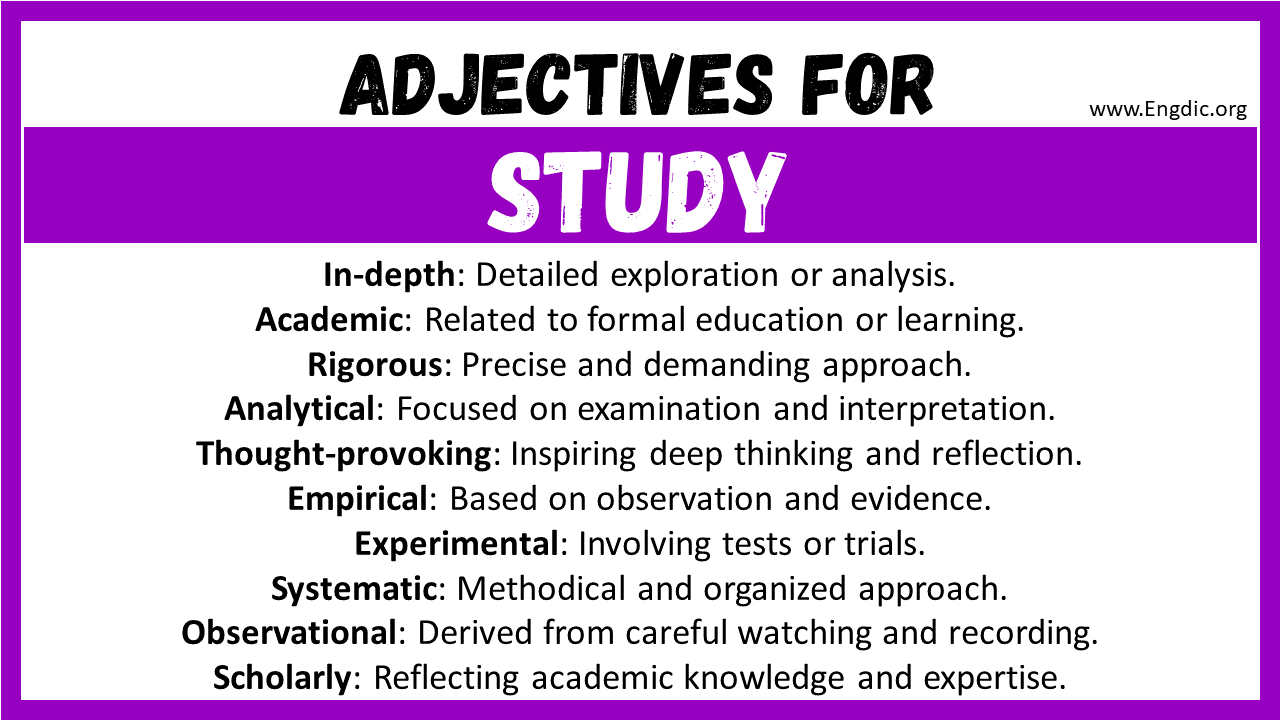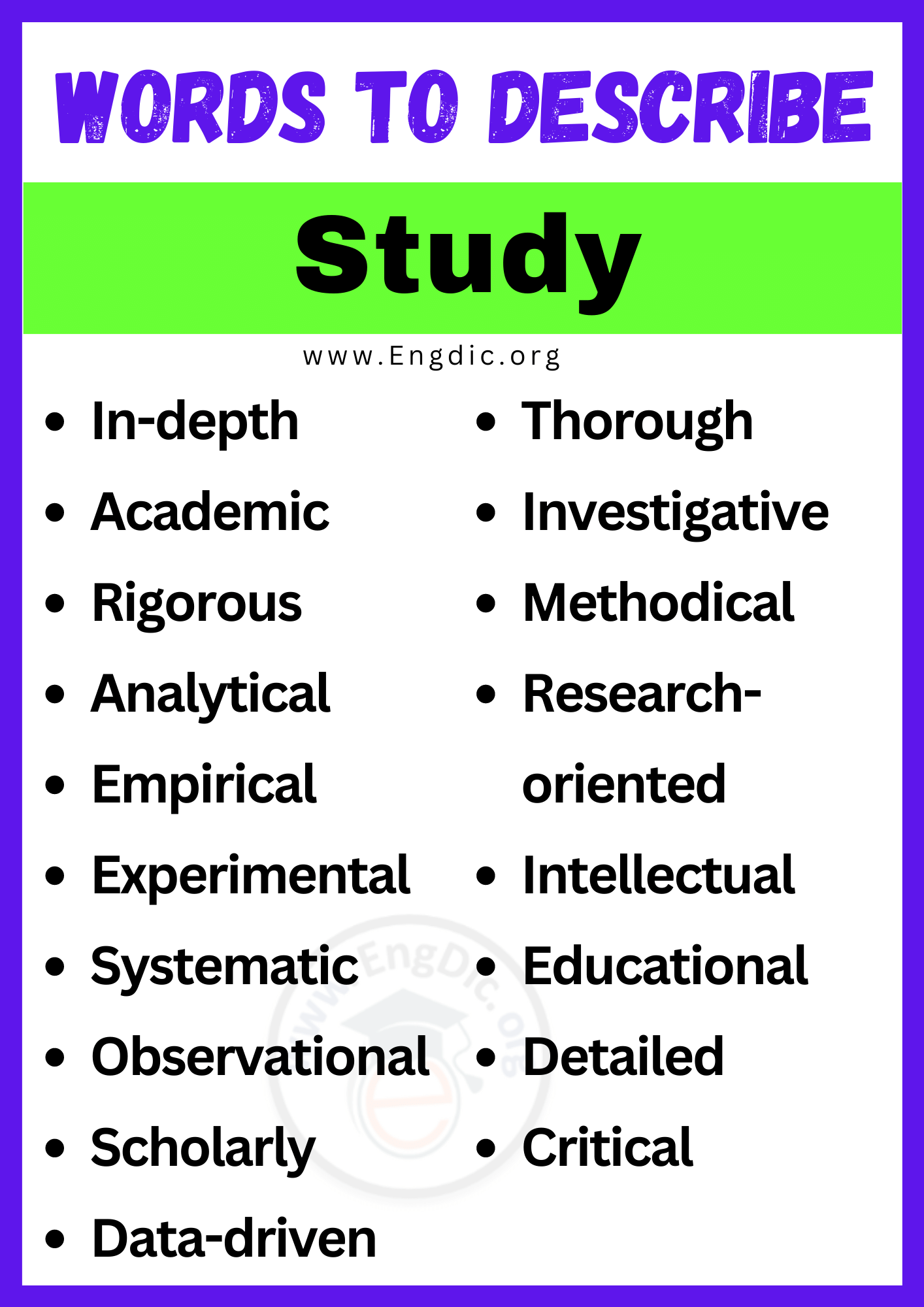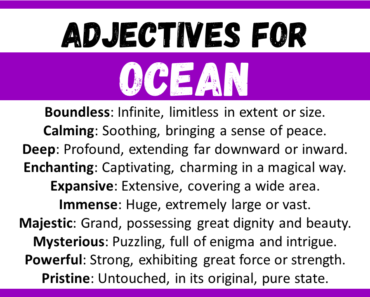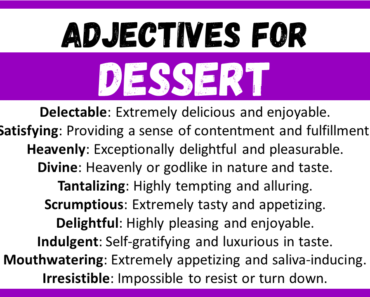In the realm of education and research, a “study” refers to a systematic and focused investigation conducted to gain knowledge and insights into a specific subject or phenomenon. Whether it’s exploring the effects of a new drug, analyzing social behavior patterns, or investigating the impact of climate change, studies play a crucial role in advancing our understanding of the world.
In this blog post, we will delve into the fascinating world of “words to describe study,” uncovering the diverse terminologies used to categorize different types of research endeavors.
Adjectives for Study
Here are the 20 Most Popular adjectives for study:
- In-depth
- Academic
- Rigorous
- Analytical
- Thought-provoking
- Empirical
- Experimental
- Systematic
- Observational
- Scholarly
- Thorough
- Investigative
- Methodical
- Research-oriented
- Comprehensive
- Intellectual
- Data-driven
- Educational
- Detailed
- Critical
Adjectives for Study Table:
- Sturdy
- Spacious
- Efficient
- Organized
- Neat
- Functional
- Ergonomic
- Adjustable
- Compact
- Stylish
Adjectives for Study Plan:
- Well-structured
- Comprehensive
- Realistic
- Flexible
- Systematic
- Effective
- Detailed
- Methodical
- Practical
- Achievable
Adjectives for Study Guide:
- Informative
- Clear
- Concise
- Engaging
- Helpful
- Well-organized
- Illustrated
- User-friendly
- Thorough
- Resourceful
Words to Describe Study with Meanings
- In-depth: Detailed exploration or analysis.
- Academic: Related to formal education or learning.
- Rigorous: Precise and demanding approach.
- Analytical: Focused on examination and interpretation.
- Thought-provoking: Inspiring deep thinking and reflection.
- Empirical: Based on observation and evidence.
- Experimental: Involving tests or trials.
- Systematic: Methodical and organized approach.
- Observational: Derived from careful watching and recording.
- Scholarly: Reflecting academic knowledge and expertise.
- Thorough: Complete and comprehensive examination.
- Investigative: Seeking to uncover and explore.
- Methodical: Following a logical and structured method.
- Research-oriented: Aimed at gathering information and data.
- Comprehensive: Covering a wide scope or range.
- Intellectual: Pertaining to intellect and knowledge.
- Data-driven: Guided by empirical information and data.
- Educational: Focused on learning and knowledge acquisition.
- Detailed: Providing intricate and specific information.
- Critical: Evaluative and analytical in nature.
Example Sentences for Study Adjectives
- The in-depth analysis revealed surprising findings.
- She received an academic scholarship for excellence.
- The project demands a rigorous research approach.
- His analytical skills impressed the team.
- The book was thought-provoking and insightful.
- The scientist presented empirical evidence to support her claim.
- The students conducted experimental trials in the lab.
- The team followed a systematic plan for data collection.
- Her observational study focused on animal behavior.
- The conference attracted scholarly experts from various fields.
- The report provided a thorough analysis of the issue.
- The detective’s investigative skills solved the case.
- He approached the problem in a methodical manner.
- The university’s library is a research-oriented resource.
- The course offers a comprehensive overview of history.
- The lecture appealed to intellectual curiosity.
- The decision was based on data-driven insights.
- The workshop provided educational tools for teachers.
- The manual offers detailed instructions for assembly.
- A critical evaluation is necessary for improvement.
Explore More Words:
FAQ’s
How to describe study writing?
Study writing involves articulating research findings and insights in a structured and informative manner, utilizing appropriate academic language and referencing.
Why do we want to study?
Studying expands our knowledge, enhances critical thinking skills, and opens doors to various opportunities for personal and professional growth.
What’s the best study method?
The best study method varies for individuals, but effective techniques include active learning, spaced repetition, and practice through problem-solving.








